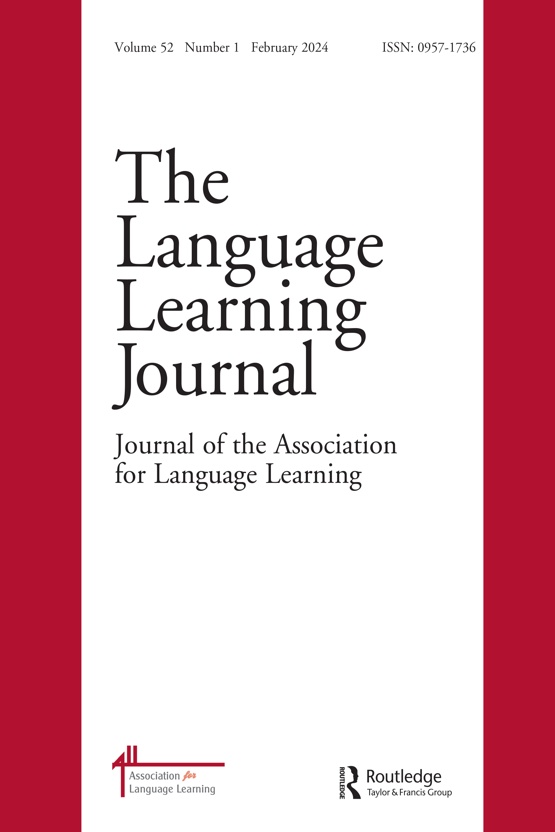Submit a Manuscript to the Journal
The Language Learning Journal
For a Special Issue on
Translanguaging as a Pedagogy for Inclusion and Social Justice in Multilingual Classrooms
Abstract deadline
15 May 2024
Manuscript deadline
16 December 2024

Special Issue Editor(s)
Zhongfeng Tian,
Rutgers University Newark, USA
[email protected]
Shakina Rajendram,
Ontario Institute for Studies in Education, University of Toronto, Canada
[email protected]
Translanguaging as a Pedagogy for Inclusion and Social Justice in Multilingual Classrooms
A prevalent misunderstanding in the application of translanguaging revolves around its intended purpose, with many educators perceiving it solely as a pedagogical tool for language instruction (Li Wei, 2023). While translanguaging offers a multitude of benefits for language learning, what makes translanguaging more than a language teaching strategy is its focus on social justice. As a “transformative pedagogy for inclusion and social justice” (Li Wei, 2023, p. 1), translanguaging can act as a catalyst to challenge raciolinguistic ideologies, dismantle the barriers of linguistic inequalities, and validate the language and subjectivities of language minoritized communities (García & Leiva, 2014). However, while research on translanguaging has become increasingly prevalent in the field of applied linguistics and language education, scholars have raised concerns about the “dilution of translanguaging’s more critical theoretical tenets” (Poza, 2017, p. 102). Flores (2014) points out that the term translanguaging has been increasingly used in ways that are disconnected from the larger political struggles in society. Similarly, Poza (2017) and Mendoza et al. (2023) caution that many studies have adopted a translanguaging lens without paying adequate attention to its social justice implications, and without the critical orientation needed to interrogate and transform oppressive language ideologies, linguistic inequalities and injustices.
For translanguaging to act as a critical and transformative pedagogy for inclusion and social justice, research on translanguaging must extend beyond examining its use for scaffolding language learning within the status quo of English monolingualism. Guided by this principle, this special issue aims to bring together studies from multilingual classrooms globally to demonstrate how translanguaging and social justice can be enacted jointly in practice. This issue seeks to include empirical studies spread over various levels of education (e.g., primary, secondary, and higher education) and regions with a particular attention to Global South contexts (see more in Tian & Rafi, 2023). While the studies in this issue offer a range of perspectives, the common themes that run through them are the role of translanguaging pedagogy in: (1) challenging conventional understandings of language in applied linguistics, (2) resisting and redesigning policies, curriculum and assessment that perpetuate monolingual standards, (3) normalizing the multilingual practices of ethnic- and language- minoritized students, and (4) affecting meaningful political and societal change.
We invite papers to this Special Issue that specifically address the intersections of translanguaging and social justice on topics including, but not limited to:
- Translanguaging for social justice across educational settings (e.g., K-12, post-secondary, community language organizations)
- Translanguaging as advocacy in English-only or English Medium Instruction (EMI) policy contexts
- Translanguaging in the teaching of linguistically minoritized, Indigenous and heritage languages
- Translanguaging and language revitalization efforts
- Countering raciolinguistic ideologies and the racialized perceptions of multilingual learners through translanguaging
- Creating more equitable curriculum and language assessments through translanguaging
References
Flores, N. 2014. Let’s not forget that translanguaging is a political act. Retrieved from https://educationallinguist.wordpress.com/2014/07/19/lets-not-forget-that-translanguaging-is-a-political-act/
García, O., and C. Leiva. 2014. Theorizing and enacting translanguaging for social justice. In Heteroglossia as Practice and Pedagogy, eds. A. Blackledge and A. Creese, 199–216. Springer.
Li Wei. 2023. Transformative pedagogy for inclusion and social justice through translanguaging, co-learning, and transpositioning. Language Teaching, 1–12. https://doi.org/10.1017/S0261444823000186
Mendoza, A., L. Hamman-Ortiz, Z. Tian, S. Rajendram, K.W.H. Tai, W.Y.J. Ho, and P.K. Sah. 2023. Sustaining critical approaches to translanguaging in education: a contextual framework. TESOL Quarterly. https://doi.org/10.1002/tesq.3240
Poza, L. 2017. Translanguaging: definitions, implications, and further needs in burgeoning inquiry. Berkeley Review of Education, 6, no.2: 101–128. https://doi.org/10.5070/B86110060
Tian, Z. and A.S.M. Rafi. 2023. Centering southern perspectives in translanguaging research. Critical Inquiry in Language Studies, 20, no.3: 205–213. http://dx.doi.org/10.1080/15427587.2023.2249151
Looking to Publish your Research?
Find out how to publish your research open access with Taylor & Francis Group.
Choose open accessSubmission Instructions
Interested authors are invited to submit a 500-word abstract (excluding references) to [email protected] and [email protected] by May 15, 2024. Notice of abstract acceptance will be emailed in June. Full manuscripts will be subject to a double-blind review process. The Special Issue is scheduled to be published in a print-issue of The Language Learning Journal in August 2026, but online publication of individual papers will take place immediately after papers have been accepted and prepared for publication. If you have any questions or queries about this Special Issue, please contact the guest editors at the email addresses listed above.